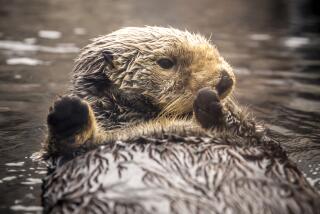Giving Nature a Nudge : Zoo Lends a Helping Hand to Encourage Romantic Birds, Beasts
- Share via
She gave him a sideward glance like the ones sailors recall in their reveries on lonely nights at sea.
The season, so it seemed, was propitious for love and courtship, forcing an ancient ritual scripted in their genes--hearts pounding, blood flowing faster. The urges were far beyond their control.
And even though this couple were a pair of ducks, canvasbacks, they were in love and loving every minute of it.
“Once he takes on that color, she’s attracted to him,” said Warren Thomas, director of the Los Angeles Zoo.
“But he has to do more than that,” Thomas said of the colorful display of plumage taken on in breeding season by the male canvasback. “He has to get himself into show biz--head bobbing and struts. It’s one thing to get her attention. It’s another to pair-bond.”
Thomas, a veterinarian, monitors courtship and breeding practices of all of the zoo’s animals; taking notes, comparing observations, even referring to texts because courtship leads to the propagation of species.
Many of the zoo’s animals, from birds to primates, are in danger of becoming extinct in the wild, thus making courtship and subsequent mating all the more important in zoos, even if the attraction between animals sometimes requires a nudge or two from humans.
The Problem With Gorillas
“We really have no real problem with the chimpanzees,” Thomas explained, “but the gorillas are much more difficult. You have to be careful about how you work them together. In the old days, when we brought them out of the wild, they identified with people and not other gorillas. So we’ve learned to break that to help them breed in captivity,” he said.
Some of the animals bred in zoos are returned to the wild in attempts to increase declining populations victimized by human encroachment on natural habitats, especially in developing countries. Others are bred and returned to the wild to ensure thriving populations that may have once been decimated by poaching.
“The little monkey called the golden lion tamarin from South America, cute little thing, weighs less than a pound soaking wet, was teetering on the brink of extinction 15 years ago,” Thomas said.
“We have reversed that,” he said, citing his efforts and those of other American zoo officials.
“There’s now a surplus of them, and we’re sending them back to the wild in Brazil.”
Thomas calls the organized breeding and returning animals to their natural habitats “a hedge against total disaster.”
“Life on Earth today is the end result of an unbroken chain that began several billion years ago and we (people) have become such a force in nature that we have the power to either propagate a species or obliterate it.
“Another heaven and earth will have to evolve before we see some of these animals again,” Thomas said of species that have become extinct.
Still, there is an academic side to the work of monitoring the courtship practices of animals. That academic side has led to the compilation of reams of material on animal behavior in captivity, suggestive of basic instincts that cross the barrier of species.
Female Decision
“It is almost always the female who decides who she’ll mate with. That decision is hers nearly 100% of the time, and I would even venture to say that it’s true with humans as well.
“It is the female of the species who decides who will be the father of the next generation. This goes on constantly in nature and this is why we have a progression of life,” he said.
But despite that feminine drive to propagate, whether breeding season occurs once or more times per year, “there has to be a courtship to establish a bond” between the animals, he said.
Solitary Pandas
“There are certain broad generalities that apply to all animals,” Thomas said, especially when it comes to courtship.
That is not to say that some captive or wild animals even know what to do in the midst of heat and potential romance.
“Some animals have an extremely demanding system. Take the giant panda for example,” Thomas said. “The female comes in heat only two days a year. Since they’re solitary even in the wild, she can go many years without being bred.
More to Read
Sign up for Essential California
The most important California stories and recommendations in your inbox every morning.
You may occasionally receive promotional content from the Los Angeles Times.










